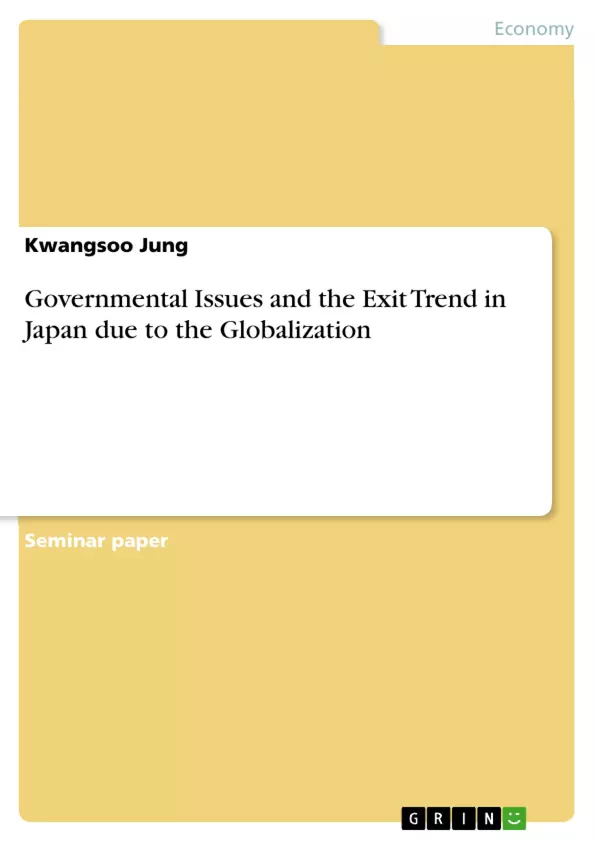While it is true that there is no perfect government, it is also true that the government is not the root of every evil. Consequently, this paper aims to examine if it is solely the government which made an exodus in the society or other factors such as active ongoing globalization was also the one influence to the exit trend. From this perspective, this paper will see how globalization affected to the exit of firms in-depth level, using the company Toyota as an example, which also mentioned in Professor Schoppa’s Race and Exit paper, and then, some Japanese citizens’ perspective will be brought so as to see their perspectives towards the government’s management.
The current market trends suggest that today, almost every product has either been shipped from a foreign country or has been manufactured in another country, or the brand is not local but a foreign brand. Origin of globalization is a long debated topic. However, the most interesting fact remains that, seeds of globalization were sown during WWII. During the Cold War, the world has roughly fallen into two categories: ones that followed democracy lined up behind the U.S. and ones that followed communism lined up behind the Soviet Union. However, as it is well known, there were many more countries that lined up behind the U.S. Despite the outnumbered countries, the U.S. did not give up strategic positions around the globe for their economic situation.
Inhaltsverzeichnis (Table of Contents)
- Introduction
- Globalization
- Moving Deeper: Globalization in 1945-1970
- Globalization: 1970-Present
- Global Market Dominating Countries: the U.S., Europe, and Japan
Zielsetzung und Themenschwerpunkte (Objectives and Key Themes)
This paper aims to examine whether the Japanese government is solely responsible for the exodus of companies from the country or if other factors, such as ongoing globalization, also play a significant role. Through an in-depth analysis of Company Z's exit, the paper will explore the impact of globalization on this trend and incorporate perspectives from Japanese citizens to understand their views on the government's management.
- Government's role in Japanese companies' exodus
- Impact of globalization on companies' exit trend
- Perspectives of Japanese citizens on the government's management
- Globalization's influence on the world economy and global trade
- The rise of the U.S., Europe, and Japan as global market leaders
Zusammenfassung der Kapitel (Chapter Summaries)
- Introduction: The introduction explores the controversial views surrounding the political-economic situation in Japan, highlighting criticisms of the government's role in societal problems, particularly in the context of company exits. The paper proposes to analyze the role of globalization in this trend.
- Globalization: This section examines the historical evolution of globalization, tracing its origins back to World War II. It discusses the impact of the Cold War, the strategic importance of Germany and South Korea for the U.S., and the subsequent development of internationalization. The chapter also explores the surge in global trade after World War II, particularly highlighting the rise of Asian newly industrialized economies (NIEs).
- Moving Deeper: Globalization in 1945-1970: This section provides a detailed account of globalization during the post-World War II era, focusing on the significant increase in global trade and the role of Europe and Japan as influential players. The impact of the Korean War on Japanese and European exports, the emergence of NIEs, and the formation of NAFTA and European integration are also discussed.
- Globalization: 1970-Present: This section analyzes the evolving global trade landscape since the 1970s, emphasizing the influence of commodity price fluctuations and exchange rate shifts. The disintegration of the Soviet Union and its impact on global trade are explored. The chapter also addresses the declining share of Japan's global exports due to competition from NIEs and China.
- Global Market Dominating Countries: the U.S., Europe, and Japan: This section examines the dominance of the U.S., Europe, and Japan as global market leaders. It delves into the factors contributing to the U.S.'s economic rise after World War II, such as its military-centric economy, industrialization, government deregulation, and the advantage of a common currency. The chapter also discusses the development of the European Union and the challenges faced in achieving economic unity.
Schlüsselwörter (Keywords)
This paper examines the complex interplay between globalization and government policy in the context of Japanese companies leaving the country. Key terms and concepts include globalization, government management, societal chaos, company exits, exit trends, globalization's influence on economic development, and the dominance of the U.S., Europe, and Japan in the global market.
Frequently Asked Questions
Is the Japanese government responsible for companies leaving the country?
The paper examines this "exit trend," arguing that while government policy is a factor, global forces like globalization play a major role.
When did the seeds of modern globalization start to grow?
According to the paper, the foundations for today's globalized market were largely sown during and immediately after World War II.
How did the Cold War influence global trade patterns?
The world split into democratic and communist blocs, with the U.S. supporting strategic economic positions globally to counter Soviet influence.
Why has Japan's share of global exports declined since the 1970s?
Increased competition from Newly Industrialized Economies (NIEs) and China, along with exchange rate shifts, has impacted Japan's dominance.
What role did the Korean War play in the Japanese economy?
The Korean War provided a significant boost to Japanese exports, helping the country reintegrate into the global market post-WWII.
- Arbeit zitieren
- Kwangsoo Jung (Autor:in), 2017, Governmental Issues and the Exit Trend in Japan due to the Globalization, München, GRIN Verlag, https://www.grin.com/document/366042



